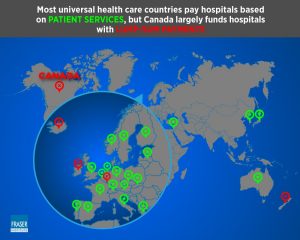Canada One Of Only 5 Universal Healthcare Countries That Fails To Pay Hospitals Based On Actual Patient Services
 BRITISH COLUMBIA – Virtually every other developed country with universal healthcare has moved to funding hospitals based on services provided to patients, while Canada remains one of only a handful of countries that funds hospitals primarily with lump sum payments, regardless of how many patients they treat, finds a new study released today by the Fraser Institute, an independent, non-partisan, Canadian public policy think-tank.
BRITISH COLUMBIA – Virtually every other developed country with universal healthcare has moved to funding hospitals based on services provided to patients, while Canada remains one of only a handful of countries that funds hospitals primarily with lump sum payments, regardless of how many patients they treat, finds a new study released today by the Fraser Institute, an independent, non-partisan, Canadian public policy think-tank.
“Over the last 30 years, the vast majority of developed nations with universal health care have moved away from the financing approach used in Canada towards a system where funding follows patients for hospital care,” said Nadeem Esmail, senior fellow at the Fraser Institute and author of Money Following Patients: A Better Way to Pay for Universally Accessible Hospital Care.
The study finds that of the 28 countries that provide universally accessible health care, only five—Canada, Ireland, Iceland, Luxembourg and New Zealand—still largely fund hospitals with lump sum payments. Conversely, all of the other 23 countries with universal health care have adopted per-patient funding models, otherwise known as activity-based funding.
Under activity-based funding, hospitals are paid an amount of money for each patient cared for based on their particular condition and unique care needs.
Paying hospitals in this manner, when coupled with appropriate initiatives to manage possible negative outcomes, creates powerful incentives to deliver a greater volume and quality of services, with the potential to reduce wait times.
“Policymakers across Canada should learn from our counterparts in other countries that have embraced per patient funding of hospitals as part of universal health care,” said Esmail.
“The way we primarily pay for hospital care in Canada runs counter to the international norm, and serves neither the interests of patients nor taxpayers who fund their care.”
See full report here.


